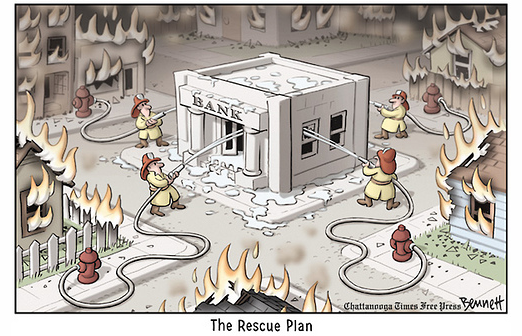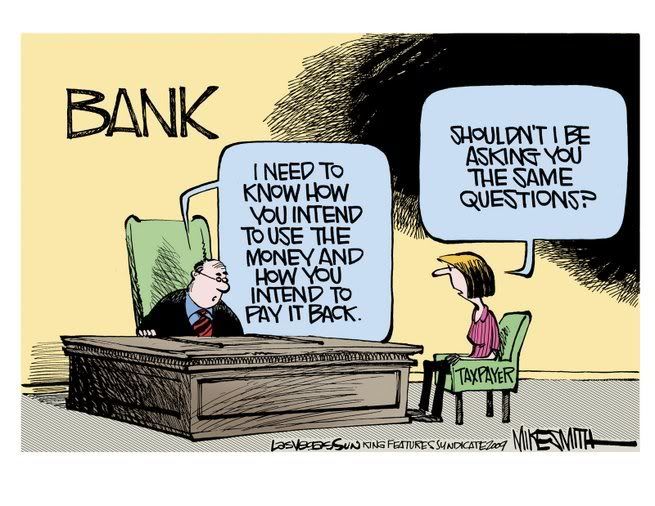 Wells Fargo (WFC) is repaying their $25Bn TARP loan.
Wells Fargo (WFC) is repaying their $25Bn TARP loan.
That makes WFC the last of the big boys to be done with the emergency loan program, just one year after it started. At this point $161Bn of the $245Bn lent out will be repaid with WFC raising $10.4Bn in a stock sale to get out from under the government's thumb – just in time to pay out the Christmas bonuses. I won't go off on a rant about how stupid it is for the banks to borrow and dilute in order to pay big bonuses and further punish shareholders by reducing earnings – it won't matter anyway, any bank but C that announces they are done with TARP gets a nice boost as it indicates they can go back to raping and pillaging as usual in 2010.
It's good that we can label this bailout a success because that way Congress won't waste time approving the next one in March when CRE fails (oops, that's supposed to be a secret). The banks were anxious to get out from under Government oversight as soon as their pay practices were called into question. Perhaps WFC was the last to pay us back as they "only" have 62 employees who got bonuses over $1M last year with just 7 employees putting more then $3M in bonus money under the tree. That's nothing compared to C, who had 738 employees who would consider anything less than $1M a pay cut and you would think GS would be the leader with 983 Million Dollar bonus babies last year but they got nothing on JPM, where 1,626 Employees got 7-figure bonus checks.
Of course, GS beats JPM on a bonus per employee basis by a wide margin but that's because JPM actually does own a bank while Goldman only pretends they are a bank when they have their hand out for government aid:

So move along folks, nothing to see here – all is well… You can tell by the sound bytes that even Obama is disgusted by this BS, particularly since the banks aren't lending and, in fact, are putting more money into their foreclosure and litigation departments to really put the screws to the consumers who hold what may be flippable properties for the banks. After a record-setting 1.5M personal bankruptcies were filed in 2009 it looks like we're on track to beat that in 2010 by as much as 30% as the banks pull even further back on consumer credit, making it impossible for consumers to extend or refinance their debts (you know, the way the banks were able to under TARP). It was Thomas Jefferson himself who warned us over 200 years ago, saying:
"If the American people ever allow the banking system to control their money, first by inflation, then by deflation; their children will one day wake up homeless on the continent their fathers conquered."
Thomas Jefferson would be mortified at what has become of our country. My bearish outlook is partially based on the very cynical view that we are heading into stage two of the banks' property siezure cycle. We had our inflation where first the banks lent money on homes and collected huge fees. Then the banks directly and indirectly speculated in commodiities and drove those prices sky high, making it impossible for homeowners to pay the banks their mortgages and eat at the same time. The banks sieze properties and write the losses off on the people, crash the housing market and then start throwing more people out of their homes so that the banks can once again own the land at the beginning of the next up cycle (which pretty much starts whenever they decide it does), where they can sell at amazing proifts.
This won't be the first time this has happened, this happens over and over again in every country since the Magna Carte first forced the nobles to give land to the peasants and the nobles quickly figured out they could bleed the peasants dry in new and exciting ways by forcing them to buy high and sell low over and over again. This was so much more fun than simply charging rents that the concept of individual land ownership caught on Word-wide, exchanging old-fashioned slavery for modern wage slavery, where people are convinced that paying off a $200,000 mortgage at $1,200 a month for 30 years is a good idea even though the borrower ends up paying $232,000 in interest (at 6%) plus all the taxes and upkeep on the property. If, at some point, the peasants should fail to pay – all the better as the the nobles take the property back (keeping fees, deposits and interest paid by the ousted peasant) and patiently wait (as they are playing a long game) for the next cycle to sell high into. If the peasant does manage to pay off the house – that's fine with the bank too because another one will buy it and the bank will collect ANOTHER $232,000 in interest ON THE SAME PROPERTY – they never had a scam like that going when they kept the land to themselves.
 Yes, Capitalism at it's finest is playing out right in front of us – these are very exciting times indeed! It's not just individuals who can't get loans, small businesses and corporations with less than A-grade paper are getting foreclosure notices as well as banks are pulling credit and just saying no to all requests for extensions and modifications. In Europe the situation is reaching crisis levels – all this despite the Trillions of Dollars and Euros in aid that has been given to the banks in 2009 that was meant to allow them to make these loans. Instead, the banks are taking their 0% government money and putting it into 3% government bonds. Better to make a 2.5% spread on $50Bn borrowed ($1.25Bn) with "safe" government bonds than lend it to homeowners and businesses with questionable assets and repayment abilities. If you were a banker and wanted to protect your $1M bonus this year – what would you be doing with it?
Yes, Capitalism at it's finest is playing out right in front of us – these are very exciting times indeed! It's not just individuals who can't get loans, small businesses and corporations with less than A-grade paper are getting foreclosure notices as well as banks are pulling credit and just saying no to all requests for extensions and modifications. In Europe the situation is reaching crisis levels – all this despite the Trillions of Dollars and Euros in aid that has been given to the banks in 2009 that was meant to allow them to make these loans. Instead, the banks are taking their 0% government money and putting it into 3% government bonds. Better to make a 2.5% spread on $50Bn borrowed ($1.25Bn) with "safe" government bonds than lend it to homeowners and businesses with questionable assets and repayment abilities. If you were a banker and wanted to protect your $1M bonus this year – what would you be doing with it?
Hong Kong fell 1.25% this morning on property concerns as the Communists are starting to get concerned about the damage that is being caused by property speculators. The Chinese government will target “excessive” property price increases in some cities, the state-owned Xinhua News Agency said. China’s property prices climbed last month at the fastest pace since July 2008, adding to concern that record lending may fuel unsustainable asset-price increases. The State Council said last week the government will re-impose a sales tax on homes sold within five years, after cutting the period to two years in January.
China faces “increased difficulties” in maintaining growth in domestic consumption, the nation’s top economic planning agency said. A recovery in external demand is “difficult,” the National Development and Reform Commission said on its Web site today, citing Vice Chairman Du Ying. The nation’s economic recovery “is not yet solid,” the agency known as NDRC said. The country still faces a “very challenging” international environment and “the domestic problems it is confronted with are also complicated,” Du said in the statement today. “The potential risks in the fiscal and financial sectors can’t be underestimated,” Du said.
Meanwhile Japan’s small businesses, the employers of 70 percent of the workforce, signaled that the economy’s export-led revival is too weak to spur spending by companies and consumers. An index of sentiment at small manufacturers will worsen to minus 42 in March from December’s minus 40, the Bank of Japan’s quarterly Tankan survey showed yesterday. Large companies plan to cut spending 13.8 percent in the year ending March 2010, the second-worst projection on record. “Even though exports are recovering, companies are still cutting costs and hiring, weighing on domestic demand,” said Hiroshi Shiraishi, an economist at BNP Paribas in Tokyo. “It’s unavoidable that the recovery will stall in the second quarter of next year.” The Nikkei flatlined today at 10,100, still below our 10,200 target.
Germany is similarly dragging Europe down with their ZEW Investor Confidence Survey, which declined for the 3rd consecutive month to 50.4 from 51.1 in November. The Greek crisis is weighing heavily on investors' minds over in Europe, even though the MSM in the US likes to pretend it's a non-issue (as they did with Iceland and the run on British Banks when I made a big deal out of them last year). Also, Airline losses in 2010 will total $5.6 billion, 47 percent wider than an earlier forecast, as oil prices rise while carriers compete for passengers with lower fares, the International Air Transport Association said. Europe is down about 1% with both the DAX (5,750) and the FTSE (5,250) once again testing our target levels together.
British consumer prices jumped 1.9% in November, also on higher fuel prices and is very close to violating the 2% mark that mandates action by the BOE. Our own producer prices jumped 1.8%, more than double the 0.8% that was expected for November by the usual "experts" as commodity prices are speculated out of control but the producers are unable to pass ANY of the increased costs down to the US consumers, who are completely tapped out. “Competition is brutal,” said Joshua Shapiro, chief U.S. economist at Maria Fiorini Ramirez Inc., a New York forecasting firm, who forecast producer prices would rise 1.2 percent. “If somebody raises their prices, someone else won’t. We’re squarely in the disinflationary camp. There is way too much spare capacity.”
Factories in the New York region expanded in December less than anticipated, indicating manufacturing may provide less of thrust for the economy in coming months, figures from the Fed Bank of New York also showed today. The bank’s general economic gauge, known as the Empire State Index, fell to a five-month low of 2.6 from 23.5 in November, way off the 21 expected by economists surveyed. Industrial Production (0.8%) and Cap Utilization (71.3%) were both better news but nothing more exciting than a rounding error. That's it for Data today – we have Building Permits and Housing Starts tomorrow along with the CPI and the Fed Statement at 2:15 so lots of fun ahead!
OPEC optimistically raised their 2010 demand forecast by 70,000 barrels a day, which is 0.07% higher but that should be enough to get oil back over $70 (up 1%) because oil bulls are idiots. That is, by the way, 70,000 barrels up after dropping 1,900,000 barrels a day this year so "only" a drop of 1,830,000 barrels a day less than 2008 in 2010 – Woo hoo!
Needless to say, we're still pretty bearish but mostly watching with cash on the sidelines, looking for good spots to deploy some capital but happy to wait out the end of the year if this market continues to act like it has been the past two weeks.


